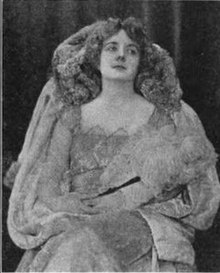Amy Ashmore Clark
Amy Ashmore Clark | |
|---|---|
 Clark in a 1922 publication | |
| Born | Amy Ashmore May 6, 1882 Toronto, Ontario, Canada |
| Died | January 9, 1954 New York, New York, U.S. |
| Nationality | American |
| Occupation(s) | Musician, songwriter, composer |
Amy Ashmore Clark (May 6, 1882 – January 9, 1954) was a Canadian-born American songwriter, composer, and businesswoman, "equally popular and successful as a writer of lyrics for other people's music, and a writer music for other people's lyrics", despite being unable to read or write music.[1] She also appeared in musical comedy and vaudeville, worked in music publishing, and at several magazines.
Early life
Amy Ashmore was born in Toronto, Ontario.[2]
Career
Clark wrote songs in various genres: hymns, ballads, novelties,[3] "every kind of song except ragtime", noted one publication.[1] She did not read or write music, but she did play piano. She was a member of ASCAP.[4] Titles of her songs (either as lyricist or composer) included "The Flowers are Calling, Sweetheart", "My Rosary for You", "Where You Are is Paradise", "Long Lost Mama, Daddy Misses You", "Toys are Not Only for Children", "And So Your Soul was Born", "With Love He Cleanses Every Sin",[5] "Laddie Dear",[6] "Rockabye Rose", "The Heart of You", "Lambie Love"[7] "I'm Telling the World That I Love You", "You and I", "To You", "Just a Cloud", and "I am One with Thee".[8] One of her songs (co-written with Florence Turner-Maley), "In a Little Town Nearby",[9] was used in theatres during showings of the silent film The Bond Boy.[10]
Clark appeared in musical comedy and on vaudeville as a performer,[11] and worked for music publishing companies.[1][3] In 1918 she was described as the head of the concert department at Artmusic, Inc.[12][13] She was also an advertising director, on the editorial board of the Junior League Magazine[14][15] and business manager of another magazine, The Younger Set.[16]
In 1931 she testified in court, in a scandal case involving theatrical manager A. L. Erlanger and his common-law wife, Charlotte Fixel.[17][18]
Personal life
Amy Ashmore married a vaudeville performer, Alexander Clark. They had a son, Alexander Clark Jr. (1901-1995),[19] who became an actor and, later, theatre editor at Vanity Fair magazine.[20] Her husband died in 1932, and she died in 1954, aged 71 years, in New York City.[21][4]
References
- ^ a b c V. B. S., "Amy Ashmore Clark: Composer, Lyric Writer, Business Woman" The Musical Observer (June 1922): 24.
- ^ Claghorn, Charles Eugene (1996-01-01). Women Composers and Songwriters: A Concise Biographical Dictionary. Scarecrow Press. p. 43. ISBN 9780810831308.
- ^ a b "Gifted Girls Who Write Songs". The News-Palladium. January 18, 1929. p. 24. Retrieved July 17, 2019 – via Newspapers.com.
- ^ a b The Final Curtain. Billboard. 1954-01-23. pp. 42.
Amy Ashmore born.
- ^ Office, Library of Congress Copyright (1919). Musical Compositions: Part 3. Library of Congress. pp. 244, 426.
- ^ Office, Library of Congress Copyright (1922). Catalog of Copyright Entries: Musical Compositions. Part 3. Library of Congress. pp. 133, 518.
- ^ "A Hush Song By Frederick W. Vanderpool". Musical Observer. 21: 57. October 1922.
- ^ Catalog of Copyright Entries: Musical compositions. Library of Congress, Copyright Office. 1945. pp. 251, 535, 700.
- ^ "Feature 'In A Little Town Nearby'". Music Trades. 64: 40. October 28, 1922.
- ^ "'In a Little Town Nearby' Scores". Talking Machine World. 18: 136. November 15, 1922.
- ^ "Good Vaudeville Bill". The Gazette. February 17, 1920. p. 9. Retrieved July 17, 2019 – via Newspapers.com.
- ^ "Artmusic Songs Booming". Music Trades. 56: 32. December 7, 1918.
- ^ "Artmusic Inc. Makes Great Progress". The Music Trades. 56: 151. December 21, 1918.
- ^ Matter of Erlanger, continued. Supreme Court Appellate Division - First Department. Vol. 7702. p. 5178.
- ^ "Junior League to Spread its News". The New York Times. December 10, 1926. p. 29 – via ProQuest.
- ^ Grant, Jane (September 28, 1923). "The Beautiful Woman". Delaware County Daily Times. p. 14. Retrieved July 17, 2019 – via Newspapers.com.
- ^ "Witness Admits Borrowing $2,500 from 'Mrs.' Erlanger". The Standard Union. November 4, 1931. p. 1. Retrieved July 17, 2019 – via Newspapers.com.
- ^ "Erlanger Witness Denies Dancing". The Standard Union. November 4, 1931. p. 10. Retrieved July 17, 2019 – via Newspapers.com.
- ^ "Stage is Natural Place for a Chip of the Old Block". The Philadelphia Inquirer. March 18, 1934. p. 58. Retrieved July 17, 2019 – via Newspapers.com.
- ^ Thomas, Robert McG. Jr. (1995-10-01). "Alexander Clark, Broadway Actor, 94, Dies". The New York Times. ISSN 0362-4331. Retrieved 2019-07-17.
- ^ "Deaths". The New York Times. January 12, 1954. p. 23 – via ProQuest.
External links
- Florence Turner Maley and Amy Ashmore Clark, "In A Little Town Near By" (1921). Vocal Popular Sheet Music Collection. Score 3622, University of Maine.
- William C. Polia and Amy Ashmore Clark, "My mother : (was the greatest gift that Daddy gave to me)" (1920). Vocal Popular Sheet Music Collection. Score 1213, University of Maine.
